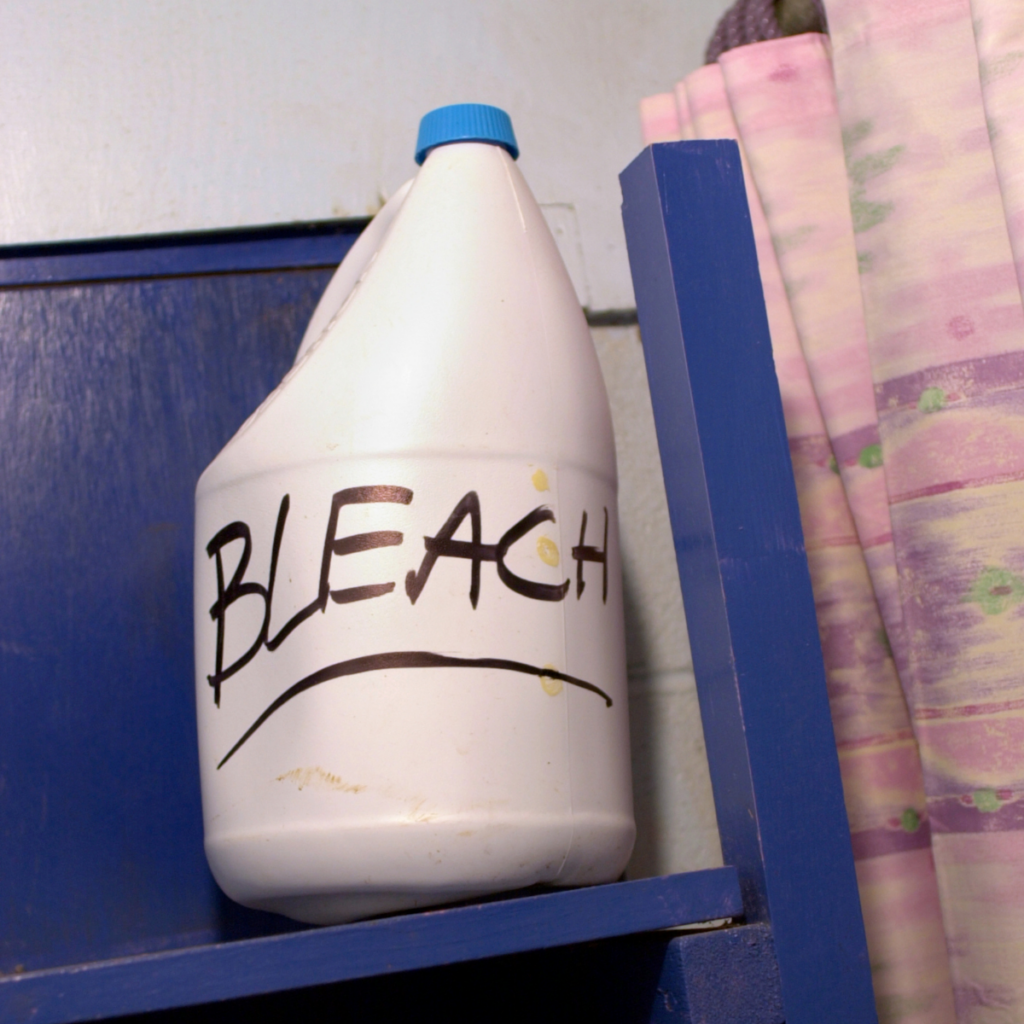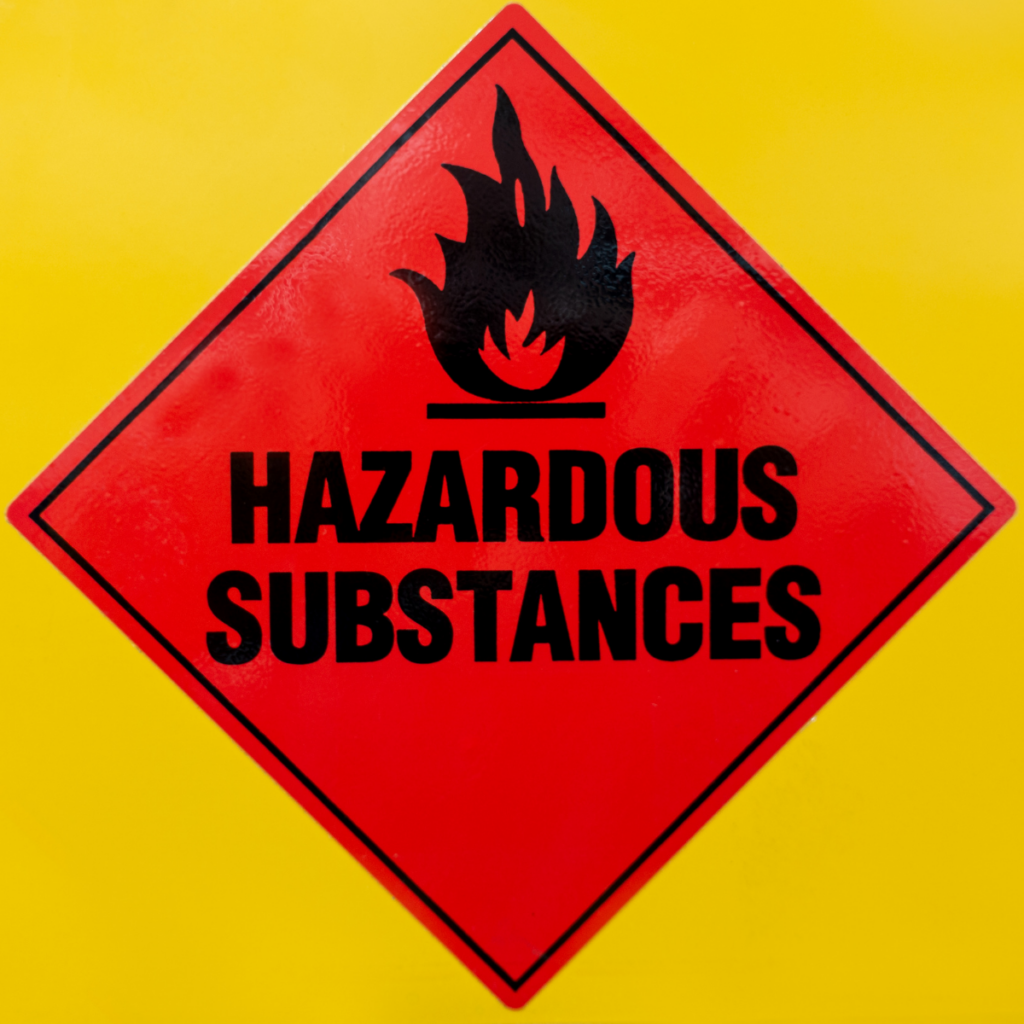We all know that bleach is a wonder cleaner, but is bleach flammable? What happens when you mix bleach with other chemicals?
Household bleach has become a staple cleaning agent in so many homes. Not only is it a stain remover, but it can also clean your bathroom tiles and toilet bowls, sanitize stuff and surfaces, and more. It’s no wonder why cleaners will always have a bottle of bleach among their cleaning products.
Although bleach is such a handy household cleaner, it is not devoid of risks. Inhaling it can irritate the lungs, and direct contact with the skin and eyes has its consequences too. But the bigger question here is this: is bleach flammable? Does it cause fire?
This post contains affiliate links. I may earn a small commission at NO extra cost to you for purchases made through these links. Disclosure.
What’s in Bleach?

Bleach is a chemical used in commercial and residential settings to remove stains in fabric. Since bleach has excellent anti-microbial properties, it is also often used as a cleaner and sterilizer, as well as in getting rid of molds and mildew.
But what is bleach made of and what makes it such an excellent household cleaner?
First, bleach contains sodium hypochlorite, as well as hydrogen peroxide and sodium hydroxide. These active ingredients make the bleach a truly powerful cleaning product.
However, using liquid bleach can be risky too. Domestic bleach contains 5% sodium hypochlorite, giving a ph level of 11, which can be irritating to the skin. Meanwhile, concentrated bleach has 10% to 15% makes it quite corrosive.
Types of Bleach
There are two main types of bleach that are commonly used in domestic cleaning: chlorine bleach and non chlorine bleach. Each of these types of bleach has its own active ingredients and purposes.
Chlorine Bleach
The active ingredient in chlorine bleach is sodium hypochlorite. It is often used as a whitening agent and stain remover, as well as in disinfecting surfaces. The same chlorine is used in sanitizing public drinking water.
Chlorine bleach gives off chlorine gas when mixed with ammonia and other acids, and this combination can be risky to human health.
Non-Chlorine Bleach
This bleach is also known as oxygen bleach. It contains hydrogen peroxide as its active ingredient. Non chlorine based bleaches have oxidizing properties, which help in whitening clothes and in removing stains. Hydrogen peroxide is not as potent as a disinfectant compared to chlorine, but it is still used in disinfecting, but many people still use it in cleaning things and surfaces.
Is Bleach Flammable?
Most bleach products, chlorine bleaches, and non chlorine based bleaches are not flammable. Remember that the active ingredients in most bleach are diluted in water. Also, their active ingredients, both sodium hypochlorite, and hydrogen peroxide do not have a flash point, hence bleach is not flammable.
But that’s not to say that you could just handle bleach carelessly. Despite the fact that bleach won’t catch fire on its own, it can still be hazardous in many ways.
Why Does Bleach Worsen a Fire?
One of the things you should be aware of, as far as bleaches are concerned, is that they can worsen a fire.
Both chlorine bleach and non chlorine bleach have oxidizing properties. Oxidizers may not catch fire, but they can make fires spread more rapidly. Chlorine and hydrogen peroxide, are potent oxidizers. Where such oxidizers are present, fires tend to grow bigger and spread quicker.
The Risks of Chlorine Gas
So while bleach is not a flammable liquid and will not catch fire by itself, you still don’t want to keep bleach near open flames and heat sources.
In case a fire breaks out and comes into contact with liquid bleach, chlorine gas is produced. Chlorine gas is one of the most toxic gases inhaling chlorine gas fumes can lead to chest pain, shortness of breath, lightheadedness, vomiting, nausea, and in worst cases, death.
Why Does Bleach Explode?

Another thing that can make bleach hazardous inside the home is when it is exposed to too much heat, such as sunlight, as such exposure can mitigate a reaction within the bleach. It is best to store your bleach away properly and not expose bleach to the sun for long periods of time.
Too much heat creates chlorine gas. This toxic gas would want to find a way to escape, until the bottle is not able to hold it any longer, to the point that the bleach explodes. As you know, chlorine gas is very toxic and dangerous, so it’s best to keep your bottle of bleach from exploding.
What about the hydrogen peroxide in non chlorine bleach?
Pure hydrogen peroxide is unstable and at risk of exploding. Thankfully, bleaches don’t contain pure hydrogen peroxide as it is diluted in water.
But that doesn’t mean there’s no chance of it exploding.
It can happen when you mix hydrogen peroxide with dangerous chemicals, such as chlorine. When you put hydrogen peroxide and chlorine together, a violent reaction takes place, resulting in an explosion.
So while bleach is generally perceived as non flammable liquid, it is not entirely safe. The chemicals in bleach are strong and potent, so always make sure that bleach is not exposed to direct sunlight and heat sources.
Related Posts:
- Is Baking Soda Flammable?
- Is Peppermint Oil Flammable?
- Does Aluminum Foil Burn?
- 8 Best Fireproof Document Bags and Envelopes
- The Symbolism of Fire
Is Bleach Toxic? Is It Hazardous?
As long as you use bleach safely and properly, it should not pose any hazard.
But let’s not forget that bleach is a very reactive chemical. Mixing bleach with other chemicals can make bleach toxic. For example, mixing bleach with ammonia creates chloramine gases. Meanwhile, mixing bleach with another acid, such as those found in toilet bowl cleaners, drain cleaners, oven cleaners and window cleaners create chlorine gas.
At this point, bleach does become toxic and hazardous.
There was this case of an employee who died after being exposed to bleach being mixed with other cleaners.
The mixture consists of sodium hypochlorite and different kinds of acids. The employee accidentally inhaled the fumes from the mixture and died later.
But why is mixing bleach with other cleaners, chemicals, and acids deadly?
Chlorine gas is a dangerous gas that was used as a chemical warfare agent in World War 2. Inhaling the fumes of chlorine gas creates a dangerous mixture of hydrochloric acid and hypochlorous acids in your lungs.
These dangerous chemicals are corrosive, so you can just imagine what they can do to your body. Your lungs will fill with liquid, and will soon fail. The damage is irreversible and you can die from what is called “chemical pneumonia.”
What Happens When You Mix Bleach and Salt?
We also get asked a lot about what happens when you put bleach and salt together. What kind of reaction does this mixture give off?
Unlike other cleaners and dangerous substances, you can mix bleach and salt without expecting anything violent or dangerous. Combining chlorine and sodium leads to the formation of sodium chloride which we commonly know as table salt.
Related post: Is Salt Flammable?
What Should You NEVER Mix Bleach With?
A bleach solution is not flammable on its own and is safe as long as you use it carefully. However, you don’t want to experiment with bleach and mix it with acids and other household cleaners, not even the typical substances you find at home.
Do Not Mix Bleach With Vinegar
Many people swear by mixing bleach with vinegar as an even more potent cleaning solution, but their combination could be really dangerous. Mixing bleach with acids in the vinegar will create chlorine gas. Chlorine gas is so deadly that it was used as a lethal weapon in Germany during the World War.
Exposure to chlorine gas for short periods results in coughing, trouble, breathing, wheezing, nausea, vomiting and irritation to the nose, eyes and mouth.
Related post: Is Vinegar Flammable?
Do Not Mix Bleach with Ammonia
Bleach and ammonia should never mixed together because they create chloramine gas, a dangerous gas that can cause shortness of breathe, wheezing, chest pain, and fluid filling the lungs.
Do Not Mix Bleach with Rubbing Alcohol
You should also never mix bleach with rubbing alcohol because they create chloroform. Chloroform is a toxic chemical that can cause damage to the eyes, lungs, and respiratory and nervous systems. It can also cause cancer. Brief exposure to chloroform is so dangerous that you could pass out, and even die.
Conclusion
There is no doubt that bleach is an incredible substance that helps in cleaning, sterilizing, and disinfecting. Bleach is not flammable because it has no flash point. The active ingredients in bleach are not flammable as well.
But this chemical can be hazardous to your health when you inhale bleach fumes or when it a bottle of bleach explodes after being exposed to extreme heat for a long time. Importantly, you should never mix bleach with another acid or dangerous substance.

Leave a Reply